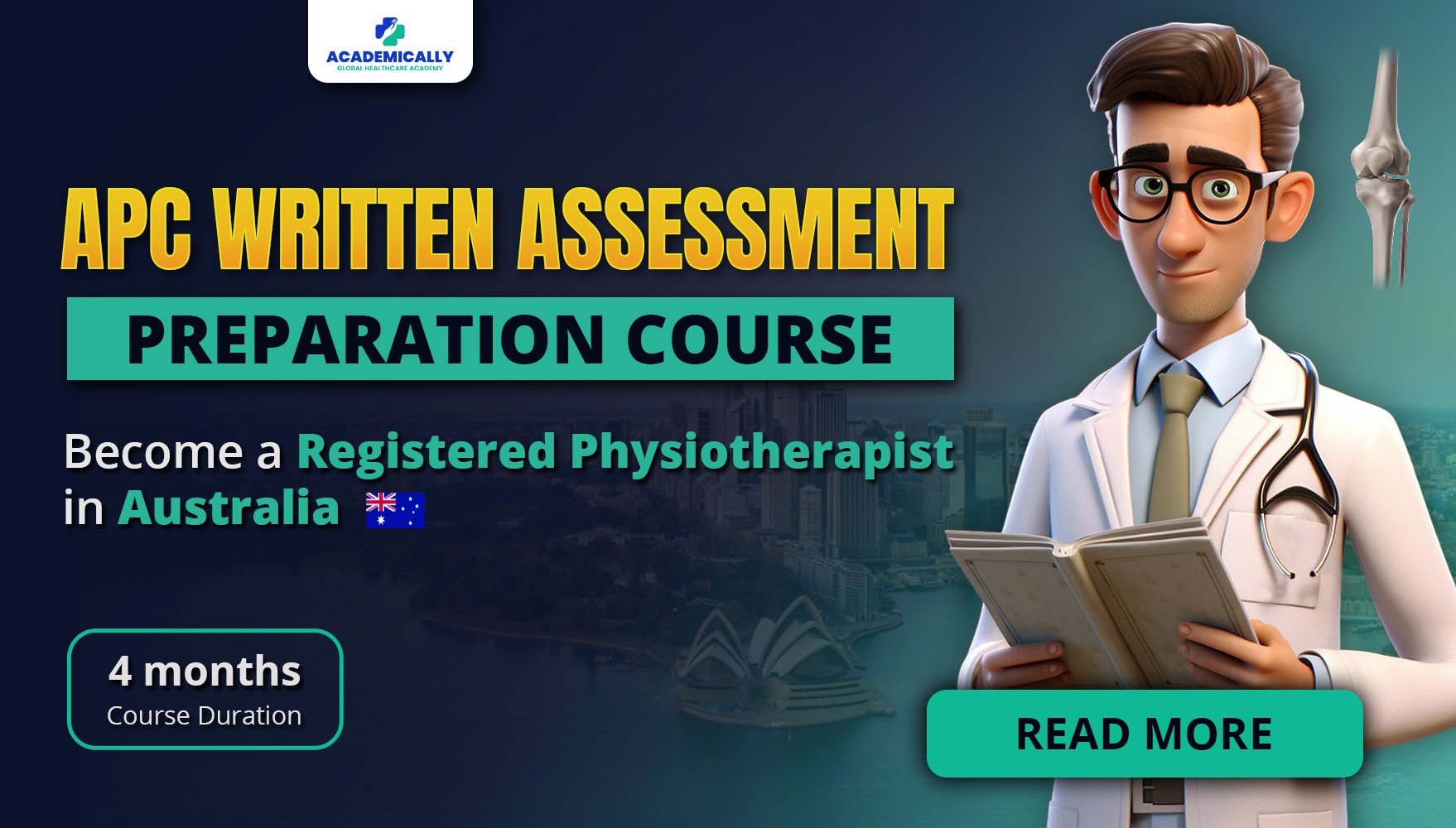Becoming a licensed physiotherapist in Australia requires passing the Australian Physiotherapy Council (APC) exam.
This examination serves as a comprehensive assessment of your knowledge, skills, and competencies, ensuring that you meet the high standards set by the profession.
To help you navigate this important milestone, this blog post will delve into the APC exam syllabus and exam pattern, shedding light on what you need to know and how to prepare effectively.
APC Exam
The APC exam is a rigorous evaluation explicitly designed for internationally qualified physiotherapists seeking registration to practise in Australia.
It comprises a written and practical exam, testing theoretical understanding, clinical reasoning abilities, and practical skills. Understanding the syllabus and exam pattern is crucial for a focused and targeted preparation strategy that will increase the chances of success.
Going through A complete guide on how to crack the APC exam will be helpful at this point, or you can even check out this video to get an idea.
APC Written Exam Syllabus
The APC exam assesses the knowledge, and application of knowledge across the following clinical areas, lifespan and settings:
Clinical Areas
- Cardiorespiratory
- Neurological
- Musculoskeletal
Lifespan
- Gerontology
- Paediatric
- Gender Health
Settings
- Acute
- Community
- Subacute/Rehab
- Remote/Rural
- Private Practice
Professional Practice
- Evidence-based Practice
- Ethical Practice
- Quality Assurance
- Risk Management
- Health Promotion
The following provides additional guidance to conditions that may be covered in the clinical areas:
Musculoskeletal
- Muscle contusions/strains/tears/weakness
- Ligament sprains/tears
- Tendinopathy, tendon ruptures/tears, tendinosis
- Fasciitis
- Joint derangements/dysfunction (e.g. loose bodies, hypermobility, hypomobility)
- Fractures, dislocations, subluxations
- Osteoporosis/osteopenia
- Tumour/pathological fractures
- Degenerative joint disease
- Mechanical spinal abnormalities (e.g. low back pain, scoliosis, postural dysfunction)
- Inflammatory/infectious conditions of the neuromusculoskeletal system
- Amputations
- Congenital malformations (e.g. talipes equinovarus, hip dysplasia)
- Nerve compression (e.g. Carpal Tunnel Syndrome, radiculopathy, spinal stenosis)
- Peripheral nerve injuries
- Neural tissue dysfunction/neuro-dynamic dysfunction
Cardiorespiratory
- Heart disease/malformation/injury (e.g. arteriosclerosis, blunt trauma, tamponade, aortic aneurysm)
- Myocardial ischaemia and infarction (including surgical interventions)
- Heart failure, cor pulmonale
- Tumour
- Pneumonia (primary or post-operative/preventive)
- Atelectasis (primary or post-operative/preventive)
- Adult/infant respiratory distress syndrome (e.g. acute lung injury)
- Asthma
- Chronic obstructive pulmonary disease (e.g. emphysema, bronchitis, bronchiectasis)
- Restrictive pulmonary disease (e.g. fibrosis)
- Tuberculosis
- Pleural effusion
- Pulmonary oedema
- Cystic fibrosis
- Peripheral arterial disease
- Venous disorders
- Post-abdominal/thoracic surgery
Neurology
- Cerebral vascular accident/transient ischemic attack
- Acquired brain injury
- Tumour
- Degenerative neurological/neuromuscular disorders (e.g. muscular dystrophy, amyotrophic lateral sclerosis, Parkinson
- disease)
- Demyelinating disorders (e.g. multiple sclerosis)
- Inflammatory/infectious conditions of the nervous system (e.g. meningitis)
- Cerebellar disorders
- Neuropathies (e.g. peripheral neuropathies)
- Developmental/birth injuries (e.g. cerebral palsy)
- Dementia, affective and cognitive disorders
Pharmacology
- Basic principles of pharmacology
- The names of commonly used drugs, mechanism of action, use/indications, dosage, side effects, and contra-indications of the drug groups listed below in the context of physiotherapy in Australia;
- Methods of drug administration including iontophoresis, injection, inhalation, etc.
Commonly used drugs in the context of physiotherapy practice in Australia:
1. Autonomic nervous system
- Adrenergics
- Adrenergic blockers
- Cholinergics
- Cholinergic blockers
2. CNS - Anti-Parkinsonian drugs
- Anticonvulsants
- Opioid analgesics
- Non-opioid analgesics
3. Cardiovascular - Antiarrhythmic
- Antihypertensive drugs
- Anticoagulant drugs
- Antianginal drugs
4. Respiratory - Bronchodilators
- Corticosteroids
- Mucolytics and expectorants
- Asthma prophylaxis
5. Musculoskeletal and anti-inflammatory - Skeletal muscle relaxants
- Anti-inflammatory drugs (including non-steroidal)
- Osteoporosis therapy
- Neuromuscular paralytic agent (Botulinum Toxin)
6.Urinary system - Diuretics
7. Other - Classes of antibiotics
APC Clinical Exam Syllabus
As the final step of the Standard Assessment Pathway, the Clinical Assessment provides an opportunity to showcase clinical expertise, reasoning abilities, and proficiency in conducting secure and proficient consultations.
This assessment occurs within the Simulation Lab, a simulated environment where skilled actors portray real-life patients. The assessment encompasses three essential practical components:
- Musculoskeletal physiotherapy
- Neurological physiotherapy
- Cardiorespiratory physiotherapy
APC Exam Pattern
The written assessment sessions for the Australian Physiotherapy Council (APC) exam are scheduled throughout the year, offering flexibility for aspiring physiotherapists. These sessions occur four times annually, specifically in March, June, September, and December.
Notably, the written assessment sessions are typically conducted on the first Thursday of the respective session month. This consistent scheduling allows candidates to plan and prepare accordingly, ensuring they are ready to demonstrate their knowledge and clinical reasoning abilities on the designated day.
APC Written Exam
The APC Written Assessment is conducted online. It comprises two papers, namely Paper 1 and Paper 2, each lasting for two hours. Candidates tackle Paper 1 in the morning and Paper 2 in the afternoon on the same day.
Across both papers, a total of 30 cases are presented, with 15 cases in each paper. These cases cover various aspects of clinical practice, encompassing different age groups, including pediatrics, and diverse healthcare settings.
In each case, candidates encounter four multiple-choice items or questions. The task is to select one correct response from four possible answers for each item. Therefore, there are a total of 60 multiple-choice items on each paper, allowing candidates to showcase their knowledge and decision-making abilities.
APC Clinical Exam
The Council's Simulation Lab in Melbourne is the exclusive venue for conducting all in-person Clinical Assessments.
The Clinical Assessment usually takes around 75 minutes, comprised of:
1. Ten (10) minutes of Reading Time for the Candidate to inspect background information about the patient
2. Five (5) minutes of Verbal Summary Time for the Candidate to provide a verbal summary to the Assessors
3. Fifty (50) minutes of Patient Time
4. Ten (10) minutes for oral clarification (Oral Reporting Time)

Conclusion
By adhering to this well-structured syllabus and exam pattern, aspiring physiotherapists can undergo a rigorous and standardized evaluation process, ensuring that they meet the necessary requirements to practice professionally and provide high-quality care to their patients.
Effective preparation for the APC Exam requires dedication, utilizing study materials and resources, practising time management, and seeking support from experienced professionals.
Additionally, participating in study groups or online forums can provide valuable insights and study strategies, enabling candidates to learn from the experiences of others who have successfully navigated the APC Exam.
If you are searching for the perfect preparation course to crack your exam on the first attempt, Academically has the best APC exam preparation course designed just for you.
Fill up this form for a free one on one counselling session



